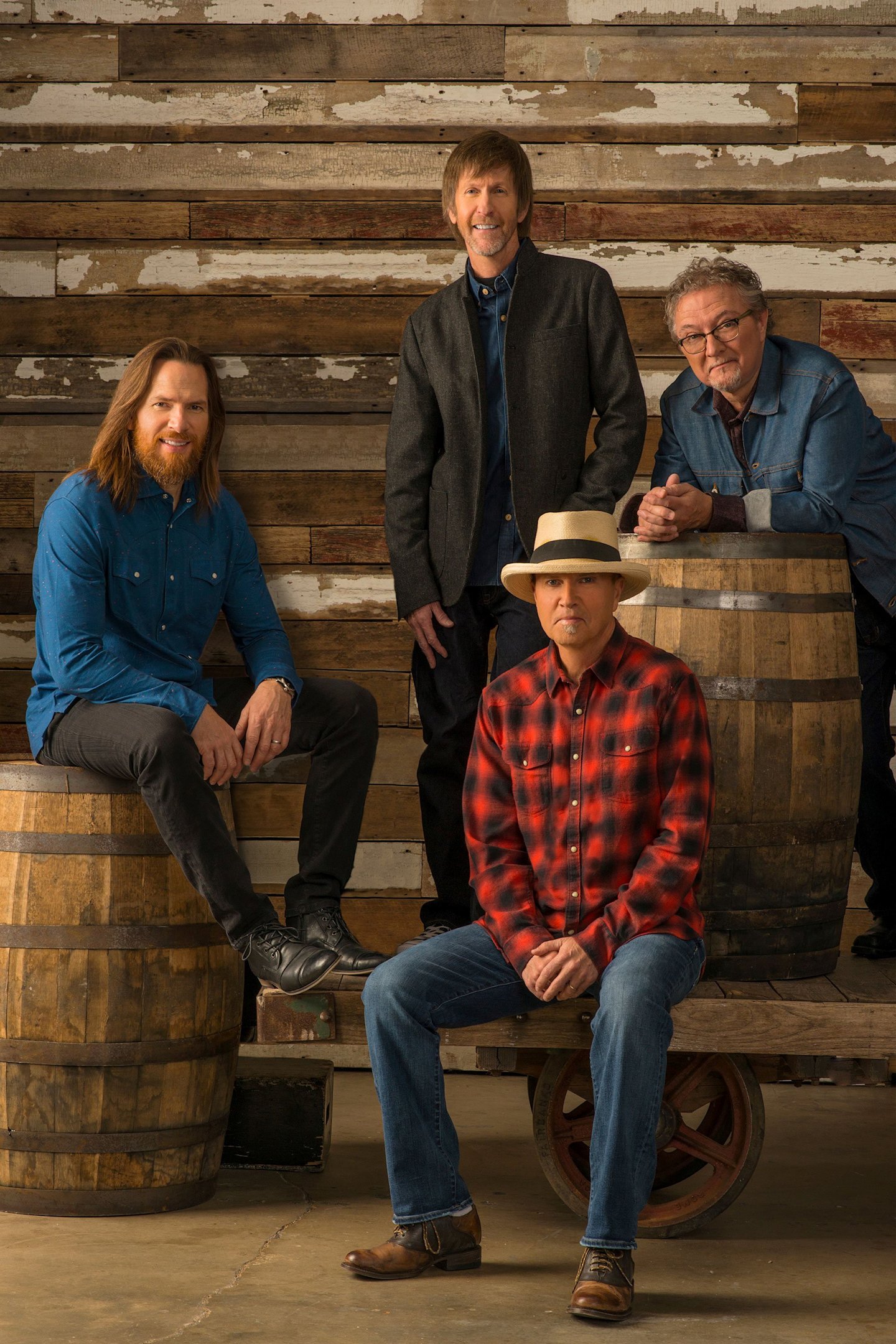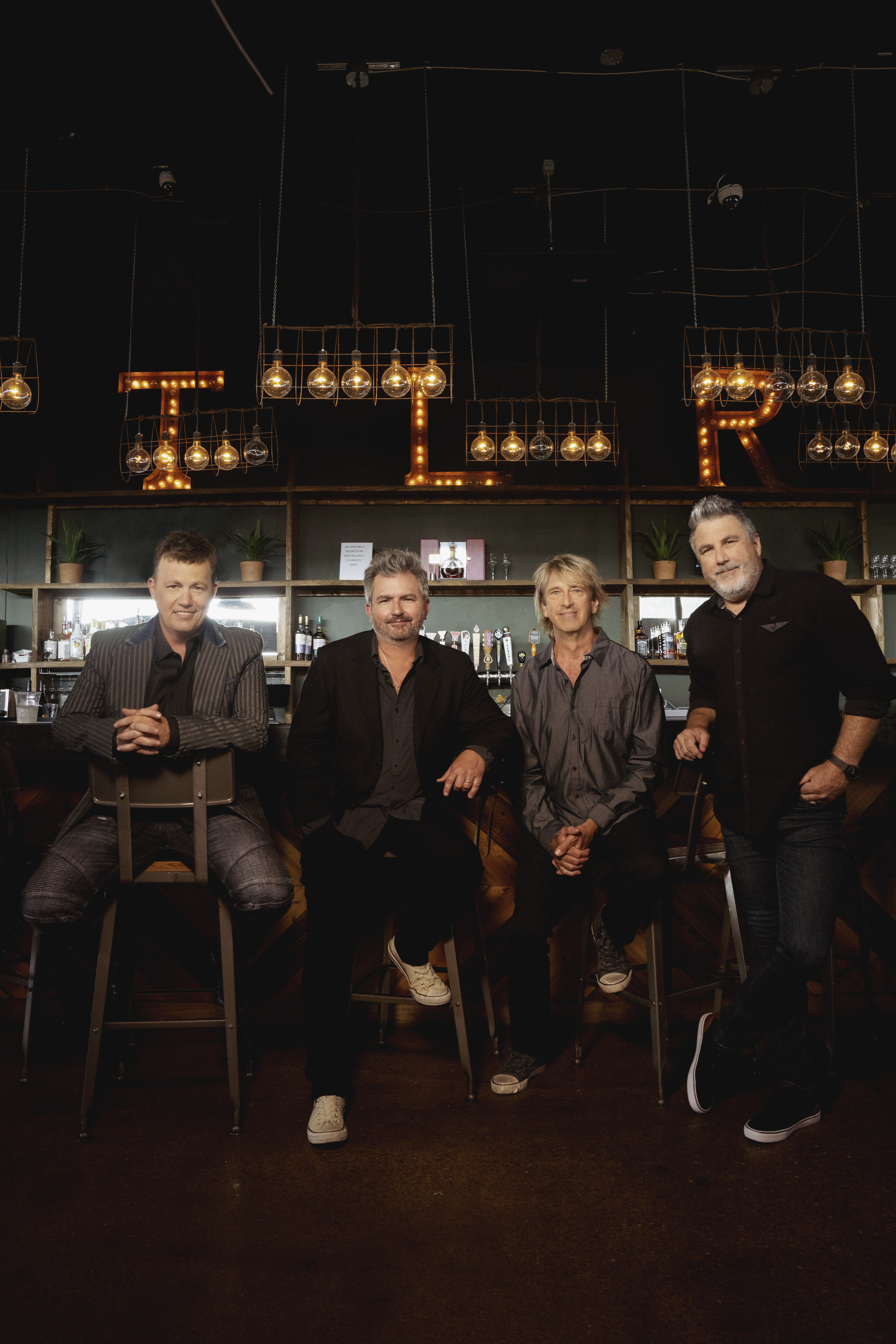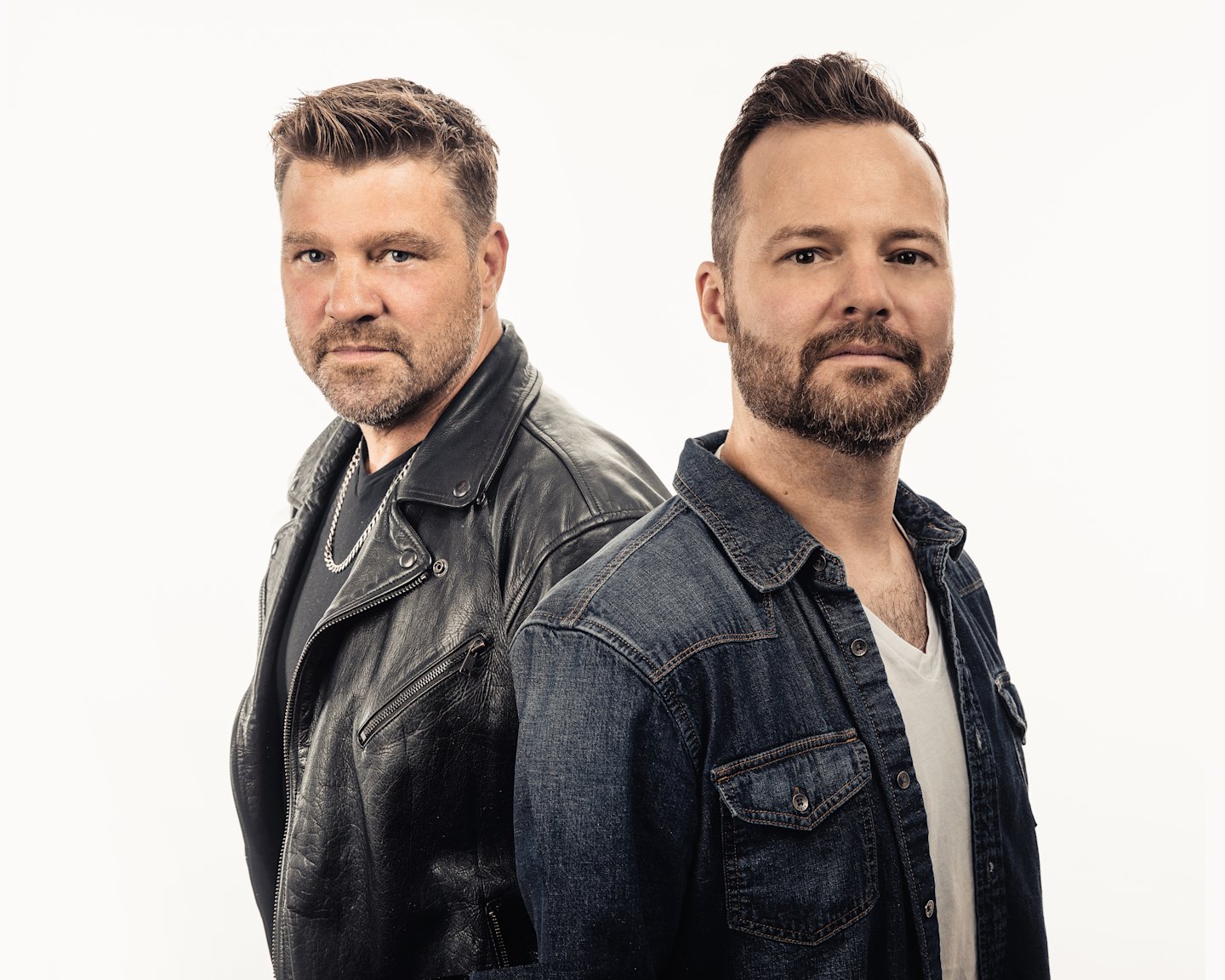Timeless Country Hits The Big Four Roadhouse!
Buy Your Tickets!Sawyer Brown

It’s hard to know where to start when talking about Sawyer Brown. More than 6000 shows and counting. More than a million miles behind them and still seeing the highway miles click by outside their bus window. Twenty-three albums. More than 50 chart singles. CMA, ACM, and CMT awards on the shelf. To pull a line from one of the band’s enduring hits: “This is the life and times of a travelin’ band.” A traveling band, indeed. Always on the move—on the road, on stage, and in their career. When asked about what keeps him motivated on the road, lead singer Mark Miller says, “It’s playing the next show. Be grateful for where you’ve been and be excited about where you’re going.”
That excitement has been on display since the very first time Sawyer Brown stepped foot onstage in the early 1980s. Beginning as the road band for another singer, Sawyer Brown broke out on their own playing everything from clubs to pig roasts in those earliest days. “There’s no such thing as a gig we wouldn’t take,” Miller laughs, remembering the beginning of the ride. “We knew that we wanted to play music and we knew that we wanted to work at being the best live band there was—and the only way todo that, was to get out and play shows. And so we did.”
It would certainly be an understatement to say that Sawyer Brown has “played shows.” The band has earned its place as one of the premier live acts in music. The band began by playing 275-300 nights a year for the first decade or more of its career—and has never come off the road. Tireless road warriors, the band thrives on playing live. “Live is where it all comes together for us,” keyboardist Hobie Hubbard says. “The audience brings its own energy, we bring our own energy and the music—and the combination of all of that is what makes playing live so unique. It exists for that moment in time—you’re either there, or you’re not a part of that moment. We’re blessed to be able to be a part of those moments night after night.”
The band’s live shows are legendary. Having been described as “the Rolling Stones of Country Music,” the band bounds onto the stage night after night, delivering its own unique brand of high-energy entertainment, and the band remains a perennial favorite at fairs, festivals, theatres, and casinos. “We love getting to hear the stories of where people have seen us play—and the number of times they’ve seen us play,” drummer Joe Smyth says. “For some, we’re their weekend getaway—they’ve seen us allover the country. But we never lose sight of the fact that on any given night, it’s going to be the first time someone’s seen us—and that’s exciting. We want that show, that night, to live up to everything they hoped for when they came to the show. Couldn’t ask for better motivation.
”Keyboard player Hobie Hubbard agrees: “It’s always humbling when someone comes up after a show and tells us that they hear themselves or their family in our music. I hope that they can look up there on stage and see themselves—because we can sure lookout at them and see ourselves. Every day we’re on the road, one of the best parts of the day is waking around whatever town we’re in and just soaking it in—listening to folks talking in restaurants, just watching life unfold one story at a time.”
One story at a time—that is certainly the way that the life and times of this travelin’ band has unfolded. “What we try to do—what we’ve always tried to do, I think—is capture those moments that matter, and capture them in a song,” Miller says. “It seems to me that it’s really the small moments in life that are the big ones, anyway.” And capture those moments the band has. From the tentative moments of transition that underscore Miller’s evocative ballad “The Walk” to the moment that a guy realizes he just might have found the right girl in the band’s energetic signature song “Some Girls Do,” the band consistently manages to bring life to those moments that all to often slip by unnoticed—unnoticed, that is, until a song sings our life back to us.
Mark Miller and his band mates have been singing our life back to us now over the span of the band’s twenty-three albums. In addition to writing and co-writing many of the bands hits, Miller has also produced many of the band’s albums. “Mark’s got a great set of ears,” bass guitarist Jim Scholten says. “When we go into the studio to work on an album, we all contribute and all kick around ideas. And Mark’s got the gift of being able to corral our energy and encourage the best out of all of us.” Scholten laughs and adds, “Just don’t tell him I said that.”
Miller’s creativity extends even beyond Sawyer Brown. He discovered the multiplatinum contemporary Christian band Casting Crowns and has produced all of their records—including winning a Grammy for one of their albums. “Working with Casting Crowns has been an amazing adventure from day one,” Miller says. “Mark Hall is one of the finest songwriters I’ve ever known, and he and the band have an absolute commitment to spreading the Gospel through the songs. It’s a blessing to get to walkalong side them in the studio.”
Connection—with Sawyer Brown, the key is in forging those connections. “Every night we’re on stage, I look at my brothers beside me on stage and think how blessed am I that I get to share the ride with these guys. And then I look out at the audience and I’m grateful that those folks have taken this ride with us,” Hobie Hubbard says.
And it really does all come down to those people in the audience for this band. As Mark Miller says, “We’re all this together—all of us. Just like the line in ‘Travelin’Band” says, ‘Now I want to take this time to thank you’—I wanted our fans to hear a thank-you coming straight from me.” It is a thank-you that at this point literally hundreds of thousands of cheering fans have experienced not only on record, but at the band’s legendary live shows as well. Known for their high-energy, no-holds-barred approach to the concert stage, the band continues to fill venues across the country with the same enthusiasm they have had from day one. “That’s one thing that has never changed,” says lead guitarist Shayne Hill. “The business part of the music business may be changing by the minute, but playing live is still about the same thing it’s always been about: connecting to the audience right there in the moment.”
Sawyer Brown is about connection. In fact, it’s likely safe to say that connection continues to be the driving force of the band. As note connects to note, as singer connects to listener, as each mile of road connects to the one that follows it, the band senses—and forges—those connections every time they record and every time they hit the stage. “I’m a real believer that things happen for a reason—that they unfold the way they do because there’s Someone bigger than us driving this bus,” Miller says. “We know we’ve still have a lot of miles in us. We’ve got our bags packed, got our gear ready, and we’ve got plenty to sing about. We want see where the trip takes us next.
”Wherever that may be, the lyrics to “Travelin’ Band” will come to life—
And now I’d like to take this time to thank you
And though it’s been a long and winding road
I count my blessings when I see your faces
And I look down at this guitar in my hand
And I take my place
On the stage
In a travelin’ band.
I’m in a travelin’ band.
Lonestar

Not every musician has the opportunity to revisit and even potentially improve upon their biggest hits. But on the forthcoming TEN to 1 record, the award-winning band Lonestar—Dean Sams (keyboards, acoustic guitar, background vocals), Michael Britt (lead guitarist, background vocals), Keech Rainwater (drums) and Drew Womack (lead vocals, guitar)—are taking a fresh look at all 10 of their chart-topping country songs.
This streak started in 1996 with the band's second single, the rock-edged "No News," which describes a man left bereft (and confused) when his girlfriend suddenly disappears, and the following year's tender "Come Cryin' to Me" and “Everything’s Changed.” The band's quadruple-platinum 1999 album Lonely Grills pawned four No. 1 hits (including the beloved global smash "Amazed") and established Lonestar as music's preeminent pop-country band—a status they'd maintain through the 2000s and beyond, thanks to songs full of energy and creative lyrics ("What About Now") and ("Mr. Mom"), along with heartfelt messages and soaring melodies (“I’m Already There”).
With these re-recordings, the band members were mindful of striking a balance between preserving the sonic elements fans were familiar with—and not repeating them. "It was a high wire act trying to figure out how to change it a little bit and not throw people off too much," Britt says. "I've seen bands that when they do the big hits that I know, and they change it up too much, I feel disappointed. I think people want to sing along—the vocal melody is what people really are latching onto the majority of time.
"That's what was in everybody's minds when we were trying to come up with different arrangements, was trying to keep the vocal melody true," he continues. "Don't change it so much that people go, 'That's not even the same song.'"
As a result, many of Lonestar's re-recordings have merely cosmetic updates and changes. "Mr. Mom" is "a little bit more country-sounding," Britt says, while Sams created some loops for "Smile" to "make it more modern-feeling, and have a little more motion," he says. "It's a little bigger-sounding than what the original record is. We kept most of the songs pretty close to the originals, but with just more updated, modern sounds."
The changes to "Amazed," meanwhile, reflect the power ballad's status as an exclamation mark during concerts. "Since it's usually the biggest part or finale of the show, we've made it a little bit more bombastic," Britt says. "We didn't want to change it so much as just to make it more epic."
TEN to 1 reflects the ways Lonestar's hits have evolved over the years during the band's rousing, high-energy concerts. For example, Britt improvised a guitar solo in the studio for the new version of "Tell Her," just as he's done live in the last few years.
"We've all played these songs live so much that we've morphed them over the years and play them a little bit differently," Sams says. "In re-recording them, it was taking all the different things that we have done and harnessing it into the best direction for today. Michael's got a lot better guitar sounds than he had when we made a lot of these hits; Keech has better drums."Sams also produced the TEN to 1 record sessions, and he approached the songs with fresh ears from both a musical and studio perspective. "I had to look at the music this time, like, 'As not only a band member, but as the producer of this record, how can I keep the integrity of what made the songs the hits they were—but also update them so when people listen to them, there's something unique and different about them that catches their ear for today's time?'"
Perhaps the biggest example of this contemporary updating is "Come Cryin' to Me," which the band members agree is the biggest sonic departure. A particular concert by indie-folk act The Lumineers inspired a completely new direction for the song; Lonestar's updated version has gang vocals, four-on-the-floor beats, and percussion that adds a galloping vibe.
Womack, who joined the group in early 2021, also put his own soulful spin on the songs, and brought his deep experience recording session and lead vocals to the studio process. "I sat there and listened to each song about 20 times, and the phrasing and the feel of the new tracks, and tried to absorb it to where I can sing it in one take," he says. "And then I went in and sang four or five passes, and then go back and listen to it and choose the best track."
The vocalist is also no stranger to chart success. He co-wrote Kenny Chesney's first No. 1 hit, "She's Got It All," while his former band, Sons of the Desert, also had multiple country hits in the '90s and collaborated with Lee Ann Womack on her crossover hit "I Hope You Dance." Drew Womack also has deep personal and professional ties to his new band; Sons of the Desert crossed paths with Lonestar many times, even opening shows for them early on.
"We actually covered a couple of the songs that I'm re-recording," Womack says. "It's surreal re-recording for a greatest hits record songs that I covered back when I was 23, 24. But it's been great. We have very similar tastes in music and similar temperaments. And I've always been a band guy from day one—so this is just like coming home, like flopping right back into a band. It feels right to me."
The rest of Lonestar also speak of how easily Womack fit into the lineup. "Everybody has a bestfriend somewhere—and then all of a sudden, at the job that you love, you get to work with them every day," Rainwater says. "It's a great feeling that one of your good friends is now one of your bandmates. And it shows on stage when we play—it comes through in the music a little bit, in the attitude and the stage presence."
Adds Sams: "His vocals are soulful. What I love about him is that you feel every word that he sings, which is probably the biggest compliment I can give. He has this really unique way of attaching himself to the lyric of the song and making the audience that is listening to him feel what he is feeling. It's a gift."
George Canyon

George Canyon rose to becoming one of Canada’s hottest Country Music stars in the early 2000’s and has won countless accolades and awards, including Juno Awards, CCMA Awards, and ECMA Awards to name a few. He has been inducted into the Nova Scotia Country Music Hall of Fame, recorded 12 albums, and was presented a certified Platinum Award for his debut album ‘One Good Friend’. With country iconic hits like Just Like You, I Believe in Angels, Drinkin’ Thinkin’, Daughters of the Sun, I Got This, I Want You To Live, Slow Dance and many, many more, he is also a highly regarded humanitarian, strong supporter of the military, and, most important, a proud father and devoted husband.
Canyon’s tireless work as spokesperson for the Juvenile Diabetes Research Foundation(JDRF)and his ongoing support for Canada’s Armed Forces has earned him much National and International recognition. Among them, he was honored with the Humanitarian Award by the Canadian Country Music Association, the Queen's Diamond Jubilee Medal, and was also made the first ever Colonel Commandant of the Royal Canadian Air Cadets by the Honourable Peter MacKay, former Minister of National Defense.
Outside of his music and charitable work, many people might also recognize George for his numerous roles on the big screen. From Charlie Wells in the hit television show Heartland and the head forest ranger in Trailer Park Boys, to Bull Shelton in the Hallmark Channel’s highest-rated original Christmas movie “One Starry Christmas”. George also guest starred on stage in the musical production of Grease in 2018 at the Winter Garden Theatre in Toronto.
Among his many identities, Canyon is also a proud Canadian and huge hockey fan, and roots for his team, the Calgary Flames, for which he is in his sixth season singing the national anthem during the home games.
George’s latest country single ‘Haunting Me’ is available now on all digital platforms.
Doc Walker

Juno and multi-CCMA award-winning band Doc Walker is back with its first new music since 2017. The single “She Wants What She Wants” will be released just ahead of the announcement of Doc Walker’s upcoming cross-Canada tour.
“She Wants What She Wants” finds Doc Walker’s creative team, singer/guitarists Chris Thorsteinson and Dave Wasyliw in top form on the song, displaying their trademark harmony, a heart-swelling chorus, and a modern spin on traditional instrumentation. The song also features OG member Murray Pulver on low harmonies helping to create that vocal chemistry so loved by Doc Walker fans.
Since forming in the town of Westbourne, Manitoba in the early 1990s, Doc Walker has earned 21 Top 10Canadian country radio singles, eight #1 CMT videos and millions of streams along with 12 CCMA Awards(42 Nominations) and a Juno (7 Nominations total).
The band has also performed in every province and territory in Canada, and shared stages with everyone from Bon Jovi to Eric Church. This year Doc Walker is further celebrating the 20th anniversary of 2001’s Curve, its breakthrough album that spawned the signature hits “She Hasn’t Always Been This Way” and “Rocket Girl.”
In summing up that milestone, and what’s in store for Doc Walker’s immediate future, Chris says, “The plan has always been to create music that we are proud of and to spend as much time as we can out on the road playing for the fans.”
Dave adds, “If there is any silver lining to what’s happened over the past two years, it’s that it’s served as a reminder of just how much we love making and playing music.”

